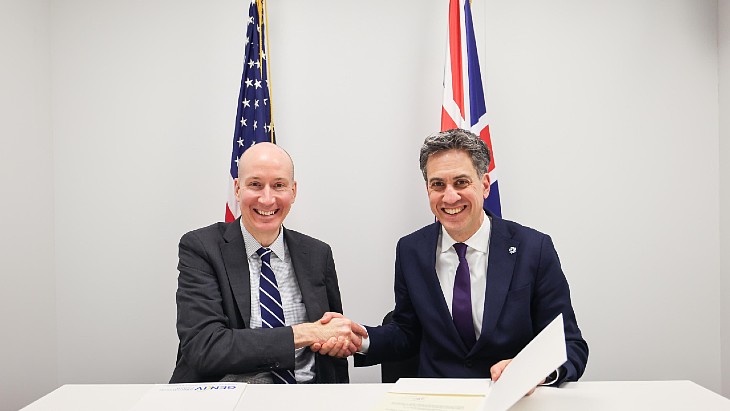Wednesday, November 20, 2024
The United States and the United Kingdom have signed a new framework agreement that will allow the Fourth Generation International Forum to continue after the current agreement expires in February. The agreement does not include Russia, which is currently a member.

British Energy Secretary Ed Miliband and US Deputy Energy Secretary David Turk signed the agreement at COP29 in Baku, Azerbaijan. Britain said its purpose was to “support the sharing of information on advanced nuclear technology” and could funnel “billions of dollars” into research and development.
Mr Miliband said: “Nuclear power will play a vital role in our clean energy future, which is why we are working closely with our allies to unlock the potential of cutting-edge nuclear technology. “It will contribute to the decarbonization of industry by providing low-carbon heat.” Power and power to support new jobs and investment here in the UK. ”
The statement also said the agreement would exclude Russia from the next phase of the Generation IV International Forum (GIF), a group of countries created in January 2000 to collaborate on research and development of next-generation nuclear energy systems. He also said. , aims to make fourth-generation nuclear power deployable by 2030.
The Forum’s work identified the development of six nuclear reactor technologies: gas-cooled fast reactors, lead-cooled fast reactors, molten salt reactors, sodium-cooled fast reactors, supercritical water-cooled reactors, and very high temperature reactors. reactor.
Current members are Argentina, Australia, Brazil, Canada, China, France, Japan, Russia, South Africa, South Korea, Switzerland, the United Kingdom, the United States, and Euratom (European Atomic Energy Community).
The United States and the United Kingdom were the first two countries to sign the new Framework Agreement, and once third countries sign it, the Framework Agreement will officially enter into force on March 1, 2025. Other member states then have three years to bring the agreement into force through their countries. If you wish to continue participating in GIF activities, please contact the decision-making body.
A total of 11 current GIF member states are said to be likely to sign the new framework agreement, including Canada, China, France, Japan, South Korea, South Africa, Euratom and Switzerland. Australia, which does not have nuclear power, was also included in the initial list of potential signatories to the agreement, but a government spokesperson said Australia was an “observer” and would remain an “observer”, The Guardian reported.
The UK Nuclear Industry Association welcomed the announcement that the US and UK had signed the framework, with chief executive Tom Greatorex saying: “This is a hugely important partnership between our two countries working on new nuclear energy…Nuclear power has featured heavily at COP29. More than 30 countries have joined the UK in working to triple global nuclear capacity. It is important that we develop our own clear nuclear energy plans, consistent with the ambitions of countries like the United States, which want to add an additional 200 GW of nuclear power by 2050. Masu.”
How does a country become a member of GIF?
According to the Fourth Generation International Forum, its specific goal is to “produce one or more Fourth Generation systems that can be licensed, constructed and operated in a manner that provides a competitively priced and reliable energy supply to a country or region. Developing a system concept.” There is a need to work toward countries where such systems may be deployed, fully addressing concerns regarding nuclear safety, waste, nuclear proliferation, and public perception. ”
“A country’s membership in the Forum is decided by the current member states (unanimous approval required) on the basis of the future national nuclear program and its ability to contribute to the development of IV generation systems. “Expected to maintain an appropriate level of active participation in collaborative projects, including participation in at least one significant collaborative project.” ”
Argentina and Brazil have the status of “inactive members,” which applies “only in the case of founding members of the GIF who have neither signed nor ratified the GIF Framework Agreement.”




